Table of Contents
Who doesn’t love spending the day at the beach?
Sun, sand, surf, a picnic lunch, and the ocean’s most well-known apex predators:
Okay, they may not be the most fun (or safe) part of the ocean, but sharks are pretty amazing.
Sharks are known for their big teeth, hunting prowess and of course, their iconic fins. Unfortunately, those fins aren’t just recognizable from the shore — they’re also popular for the supposed health benefits they bring to people who consume them.
Since sharks have no bones, their bodies, including their fins, are cartilaginous and a source of chondroitin. This chemical naturally occurs in humans and pets and helps make up your cartilage, so naturally, supplementing with it can improve joint health.
But what if the pet supplement you’re feeding your beloved dog contains shark cartilage?
That can be a problem. There are ethical and health implications you should know about before deciding to choose shark cartilage for dogs in a canine joint supplement.
Ready to learn more? Let’s dive right in 🌊
The Science Behind Shark Cartilage for Dogs
So you’re probably asking yourself right about now — who was the first person to look at a Shark fin and say, “well this should cure my joint pain”?
The answer is a bit murky.
Shark fins have been sought out for their supposed ability to do everything from improve your skin, care for joints, boost your energy and prevent heart disease for centuries. Traceable back to the Song Dynasty (960-1279) shark fin soup was thought to have been invented as a status dish and in time became one of the most popular ways to get the benefits of shark fins. More recent decades have seen supplements made of ground shark cartilage make their way onto the market touting the benefits of what shark cartilage is ultimately ‘made’ out of and what makes it good for your joints — glucosamine and chondroitin.
Once science started to catch up with the traditional beliefs and we could really see what components were the most important parts of shark cartilage, we determined other ways to get those sources.
So before you ask where to buy shark cartilage, you might want to know a little more about the realities of what consuming shark cartilage for dogs can mean for health, as well as the environment.
So let’s get our lab coats on and get into the science behind shark cartilage for dogs.
What is Chondroitin?
Before we get into how buying shark cartilage for dogs can be detrimental to marine ecosystems and understanding some of the other major drawbacks, we should talk a little bit about the reason people are buying shark fins in the first place —chondroitin.
One of the reasons people began eating shark fins is all for the benefit of absorbing chondroitin.
This seemingly simple chemical found in both human and animal cartilage (like shark fins) can be consumed to help prevent your cartilage from breaking down or deteriorating over time.
And why does stopping or slowing cartilage from breaking down matter? Cartilage is connective tissue, and its job is to be the cushion between the ends of your bones. So as ageing or injury causes cartilage to break down, it can impair mobility and lead to serious discomfort.
That’s where chondroitin comes in. By promoting water retention and elasticity in cartilage, it helps to absorb shock from movement and provides nourishment in the joint lining. It also inhibits the destructive enzymes leukocyte elastase and hyaluronidase that wear away cartilage, slowing down the wear and tear on the cartilage.
Chondroitin is the component to prevent cartilage from breaking down or deteriorating.
Chondroitin is often combined with glucosamine to form many joint health supplements, for both humans and pets. Shark fins have been commonly harvested as a source of chondroitin in these supplements, but that’s not the only way you can source this key ingredient.
Bovine cartilage is a long-studied alternative that offers the same benefits of chondroitin without the negative ethical and environmental repercussions of buying shark cartilage for dogs.
How Did Shark Cartilage for Dogs Become Popular in Pet Supplements?
OK, so now that we’ve taken a trip back to high school science class and we understand what chondroitin does and how it works, let’s put it into the context of dogs.
Due to improvements in nutrition and vet care, dogs are living longer than ever before. Since they are living longer, dogs face more chronic degenerative conditions that affect their quality of life in a major way.
Just imagine your furry friend going from jumping up to catch the frisbee mid-air to barely getting up from their bed as they get older.
Other common signs of age or injury-related problems include:
- Reluctance to walk up a set of stairs or to jump up
- Stiffness in their joints
- Slow to rise from the ground
- Abnormal gait
If you start noticing these kinds of behaviours in your dog, it might be time to talk to your vet about trying a pet supplement that includes chondroitin to help maintain and repair their cartilage.
Chondroitin can give your ageing dogs comfort and extend their years of mobility, but it also benefits younger pups as well.
Active puppies can experience tendon and ligament injuries that can happen during playtime, regular activity, or even just jumping on or off the couch the wrong way. That’s why it’s important to make sure you have preventive care in the form of a supplement containing chondroitin.
But what if the idea of ordering some shark cartilage dog treats for your furry best friend makes you cringe?
For years, retailers have offered dog treats touting the benefits of this “naturally-sourced” chondroitin, from powders to dried cartilage treats. Shark cartilage dog treats may seem like the easiest and most natural way to get vital nutrition to your pet, but it’s not the best option out there.
Sharks live long lives, accumulating environmental toxins like mercury along the way. According to a 2014 study, these toxins (specifically mercury and beta-methylamino-L-alanine,) can appear in shark cartilage products. Both have nasty side effects as mild as muscle weakness and memory loss (if you really want to call that mild) to as serious as paralysis and imparied hearing and vision — and together, they’re basically a dangerous tag team working to take your nervous system down one dose of shark cartilage at a time.
Thankfully, you don’t have to risk your dog’s exposure to deadly toxins to reap the benefits of chondroitin and glucosamine. Supplements like TRI-ACTA for Pets have replaced the need to harvest shark cartilage, so you can rest easy that you are only improving your pet’s health and not detracting from it.
Truths and Myths on Shark Cartilage for Dogs
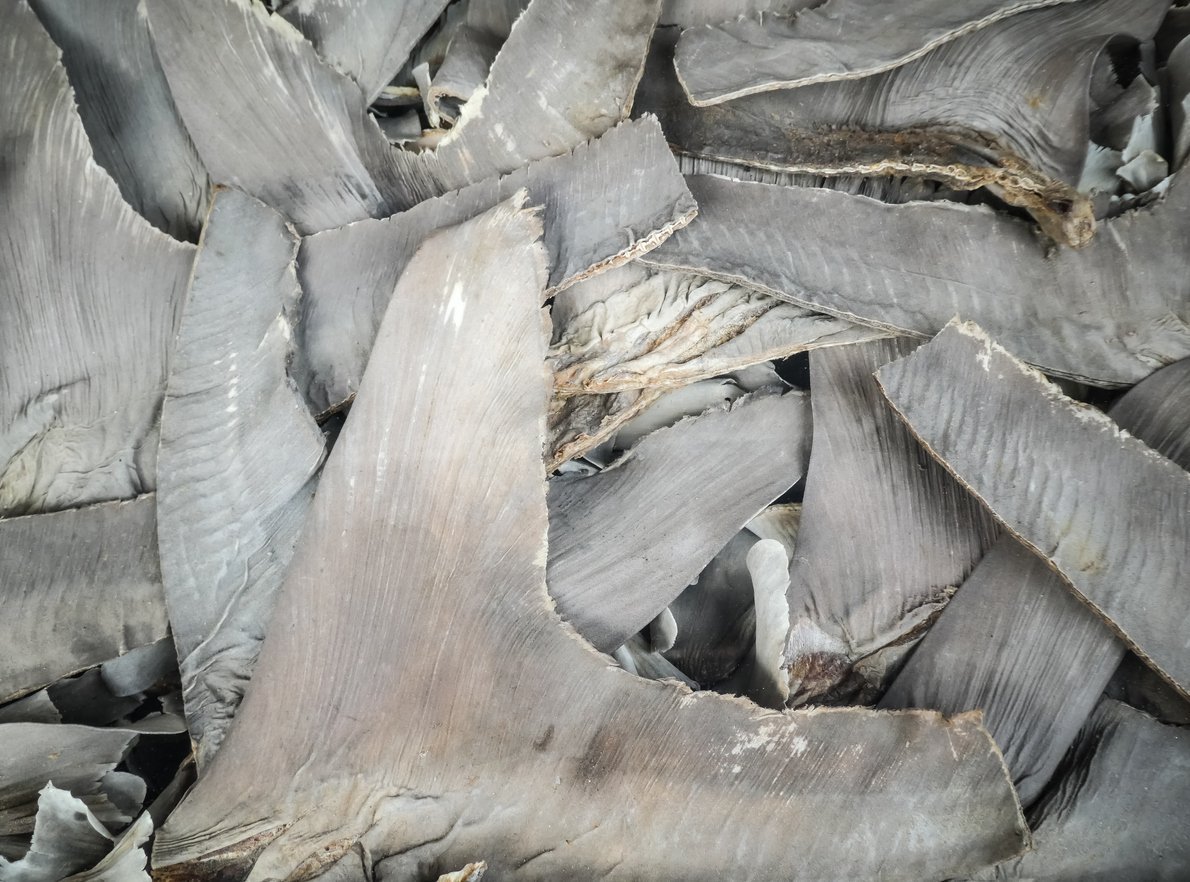
Now that you’ve gotten the idea that shark cartilage for dogs may not be the best way for our furry friends to get chondroitin and glucosamine into their diets, let’s get some myth-busting taken care of so you know once and for all why shark cartilage for dogs is not the treat you think it may be.
The Legalities of Shark Cartilage in Canada and Other Parts of the World
The Government of Canada has banned the ‘finning’ of domestic species since the mid-1990s. This deadly practise of removing a shark’s fin and releasing it back into the water ultimately leaves them unable to swim and causes them to sink to the bottom of the ocean.
Not fin-tastic if you ask us.
Though Canadians are not able to buy domestic shark cartilage, imports of shark cartilage were not banned until 2019. Currently, there are 32 countries and jurisdictions that have a full or partial ban on shark finning, and another 22 that have full or partial bans on shark fishing in general.
But that doesn’t mean that shark cartilage-based supplements for humans or pets are off the table.
In fact, you can still, unfortunately, buy these harmful products online with just a few clicks from retailers in Canada and the USA and are in a legal grey area.
For now, it’s mostly up to the consumer to read the label and look for things such as the following to indicate it is shark cartilage free:
- Suitable for a vegetarian diet
- Ethically-Sourced ingredients
- Vegetable capsules
- Contains no shark cartilage
- Bovine-Sourced Chondroitin
Whether it is for humans or pets, shark cartilage supplements are ecologically damaging and unethical to consume, and not the safest way to get that extra joint health boost either.
Shark Cartilage Extraction From Marine Ecosystems
That whole finning thing we mentioned? Yeah, that’s not great for the marine ecosystem as you might have guessed.
Let’s put it into numbers.
Before Canada’s ban on importing shark fins, 148,000 kg of the product was imported into Canada in 2018 alone. That’s a lot of sharks without fins.
Now think about the whole world. From 2000 to 2012, global demand for shark products increased by over 40%. And where does that leave the shark population?
We know that approximately 73 to 100 million sharks are killed around the world each year just for their fins, leaving some populations of shark species functionally extinct, and unfortunately, it’s not just the sharks paying the price for human activities.
Have you heard of the term, symbiotic relationship? Again, we’re taking you back to high school science class, but understand that removing one creature from the food chain is detrimental all the way down. Sharks are apex predators that keep the food chain, and biodiversity, intact.
The chart below is just one example of how removing a shark can impact the rest of its ecosystem.
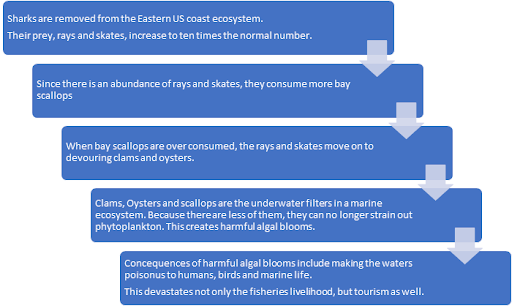
Now that you can see how marine ecosystems are devastated by finning, you can understand why buying shark cartilage for dogs is not the optimal way to get your furry friend’s joints healthy.
Pros and Cons of Shark Cartilage and Chondroitin Alternatives
So we know your pets can get joint health support from shark cartilage, but what else is out there?
Like we mentioned earlier, chondroitin is found in shark cartilage and other animal cartilage, — but what option is best? We considered the alternative to buying shark cartilage for dogs so you can make the best choice for your pet.
Shark Cartilage
Coming from a shark’s fin, shark cartilage is often cited as a good way to get chondroitin into your pet’s diet, however, there’s plenty of cons to discuss with this so-called “natural” way to get the benefit of healthier joints.
The chart below outlines some of the pros and cons of buying shark cartilage for dogs, and we want to reiterate that we recommend avoiding products that source ingredients from shark cartilage.
| Pros | Cons |
|
|
Bovine or Cow Cartilage
While sharks and cows may not seem to have a lot in common, they are both common sources of naturally occurring chondroitin. Bovine cartilage can be used to make joint health supplements for pets, or you can purchase whole cow ears as a treat your dog can chew on.
Thankfully, the method of sourcing chondroitin from bovine cartilage is much more ethically sound than getting it from shark cartilage. The chart below outlines both pros and cons of using bovine cartilage to get chondroitin.
| Pros | Cons |
|
|
Top Ethically Sourced Joint Supplements
With the different sources of chondroitin in mind, you’re probably wondering how to supplement your pet’s diet with the right product that will meet your pet’s needs and doesn’t have ethical implications that have you cringing every time you pick up the package (shark cartilage dog treats, we’re looking at you).
You could spend hours sifting through your options, or you could read our round-up of the best ethically sourced joint supplements for pets and find out how our TRI-ACTA supplements stack up against the competition.
So let’s jump into some of our picks!
GeriActive
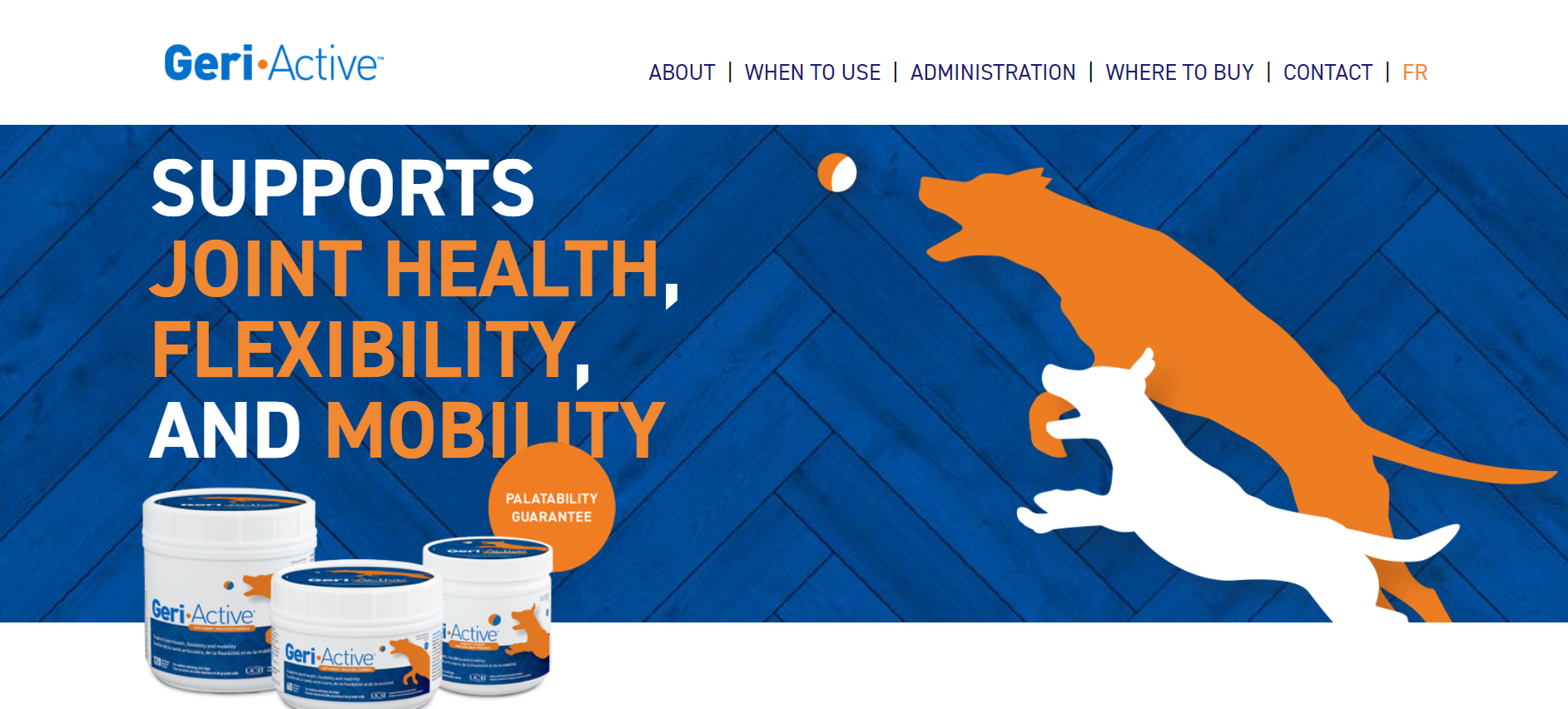
One option for pet paw-rents seeking an alternative to giving shark cartilage dog treats to your furry companion is GeriActive’s Soft Chews. Containing both Glucosamine and MSM, as well as a host of other vitamins and minerals that help support ageing dogs, as well as those with injuries or recovering from surgery, these are simple to administer and definitely promise a lot of benefits off the top.
One great bonus with these chews is that they come in two formats:
- Mini Chews for small dogs up to 15 kg
- Regular Soft Chews for medium and large dogs over 15 kg
These soft chews are touted for their palatability and ease of administration due to their soft texture and simple dosing guidelines (about one chew for every 16 kg for large dogs)
The catch? While it may be marketed as palatable, reviewers say as much as it helps their pets, it doesn’t win flavour points from dogs themselves.
Another thing to note about Geri-Active is that there’s a whole host of fillers in these treats, including:
- Wheat Flour
- Chicken Meal
- Glycerin
- Soybean Oil
- Corn Starch
- Lecithin
- Maltodextrin
- Lactic Acid
- Potassium Sorbate
- Mixed Tocopherols
- Sodium Benzoate
Simply put, that’s a lot of unnecessary stuff your pup doesn’t need.
Price: $39.95 (120 Mini Soft Chews), $49.95 (60 Regular Chews) as of November 2021
Paramount Pet Health Liquid Glucosamine for Dogs (Vegetarian)
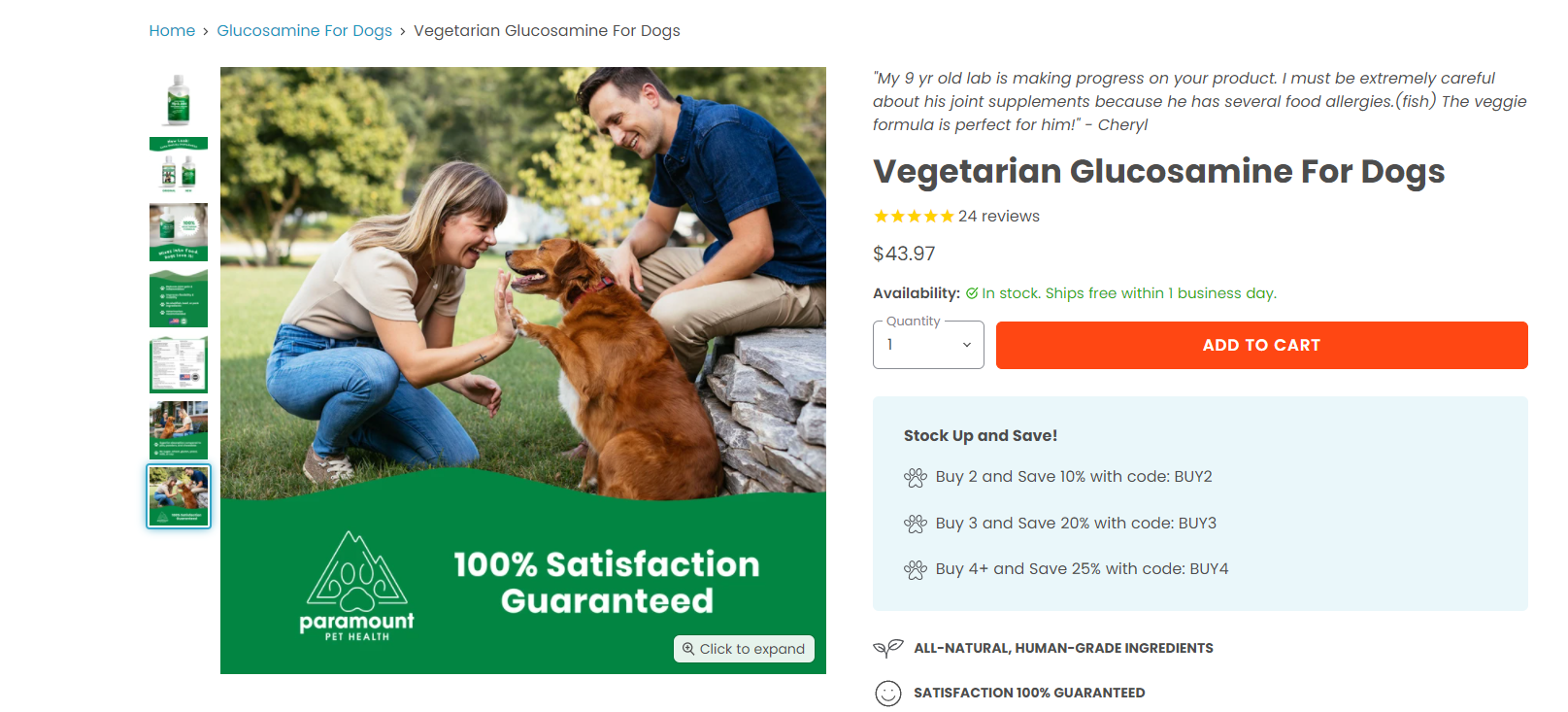
On to our next pick, Paramount Pet Health’s Vegetarian Glucosamine For Dogs. This liquid format supplement offers all-natural, human-grade ingredients. It’s also vegetarian, which means it has no bovine, porcine, or shellfish cartilage as its chondroitin source.
Yep, that means your furry friend gets the joint health they need, but you can rest easy knowing this brand isn’t using shark cartilage in its ingredient list.
On that note, the ingredients list offers an array of vitamins and minerals for your pup, but one problem we see? There’s still a few fillers ( six to be exact) we could do without, including:
- Citric Acid
- Xanthan gum
- Stevia
Another gripe we have with this option? There’s just one form of glucosamine in its formulation.
Price: $43.97 as of November 2021
Integricare TRI-ACTA
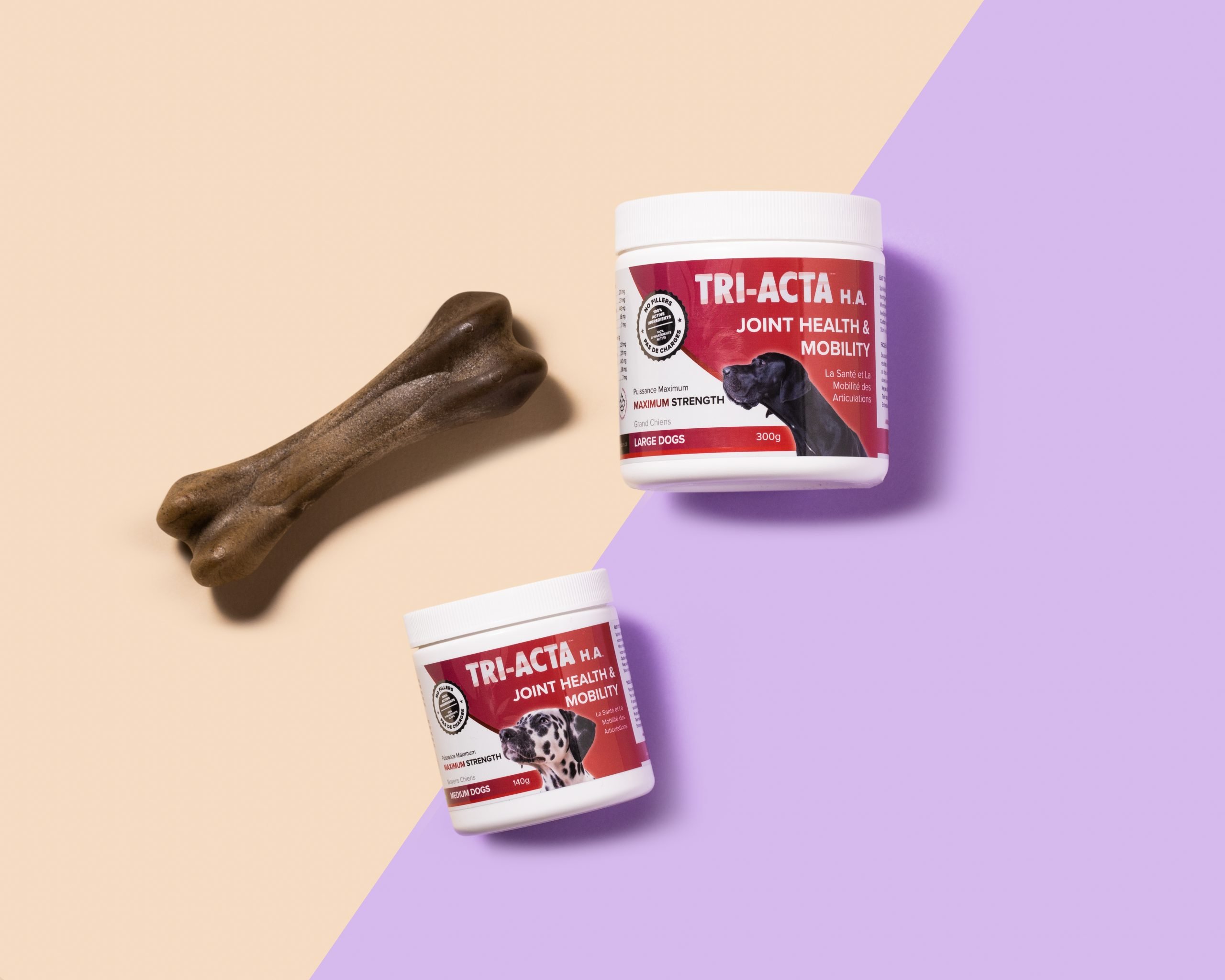
Last but certainly not least is our own TRI-ACTA formula.
Listing our own product here might seem a little biased, but Integricare has been making the best ethically sourced joint supplement in North America for over two decades. We’d like to think we know a thing or two about making sure your furry companion can live longer without the need to feed them shark cartilage dog treats to get that longevity and quality of life they deserve.
But seriously, why should we toot our own horns?
The bottom line for us is that using shark cartilage for dogs is not the best, safest, or most ethical way to get their daily dose of chondroitin. Our ethically sourced chondroitin offers quality and efficacy assurances that you can’t get from using shark cartilage.
So what other things make TRI-ACTA the best option on the market?
Here are a few things you’ll want to know:
- No fillers and 100% active pharmaceutical grade ingredients in the formulation mean no room for junk your dog doesn’t need, and it also means a better bang for your buck
- Simple to serve powder with a small serving size (1g per 35lb) is easy to administer
- Two forms of glucosamine (sulfate and hydrochloride), paired with chondroitin, offer the best efficacy when used together
- Easy to pick up from a local retailer, or order online and have it delivered to your door
Oh, and you don’t have to take our word for it. Our regulator, Health Canada, has approved our supplements as Low-Risk Veterinary Health Products, so you know you can trust TRI-ACTA for your pet.
Have a senior pet? We also offer a special formulation that is higher-strength and includes hyaluronic acid (H.A) to make your pet’s ageing joints more flexible and shock-absorbent.
Price: $23.99 – $64.99 as of November 2021
TRI-ACTA H.A. for Pets
Our maximum strength formula is optimally designed to accelerate the formation of cartilage, minimize inflammation, expedite the healing process, and improve joint conditions.
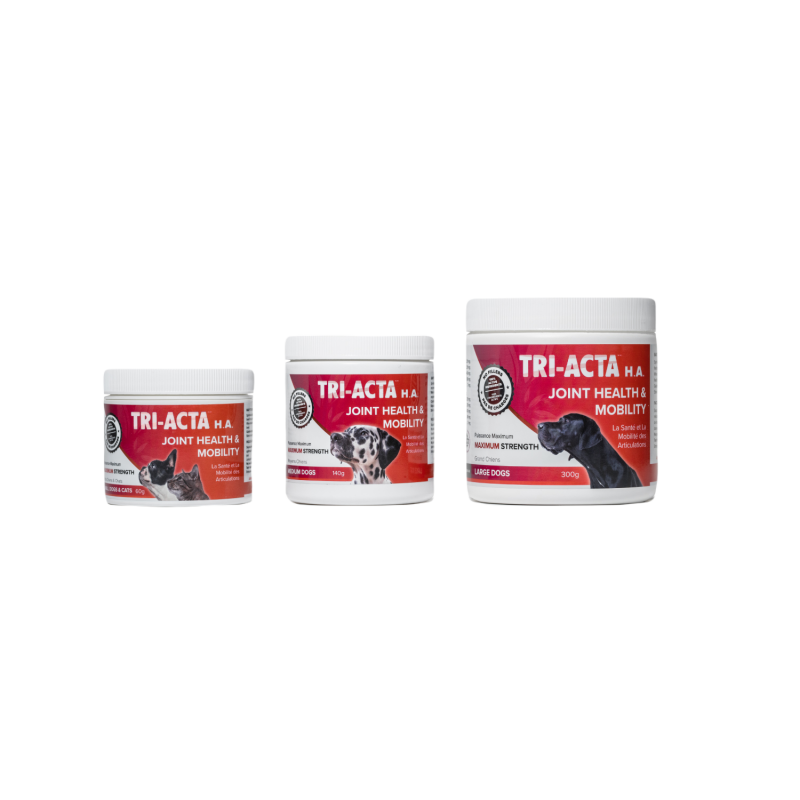
How to Start Preventing Dog Joint Problems

Making sure your pet has the right things to supplement their diet is just one responsibility you have as a pet paw-rent but the other huge thing to understand is that you also have an ethical responsibility to choose supplements that don’t in turn damage the ecosystem of other animals.
The bottom line is that choosing shark cartilage for dogs needing chondroitin support has significant negative consequences on marine ecosystems.
Oh and the other thing?
If you want to ensure your dog is able to be an active member of the family for years to come, you need to remember a few things about how ageing and injury impacts your beloved companion:
- As dogs age, just like humans, their cartilage begins to break down. Injuries can also cause damage to the cartilage in your dog’s body.
- When cartilage breaks down, your dog starts to lose the cushion between the ends of their bones, causing them to experience pain, stiffness or lack of mobility.
- Chondroitin is one chemical that makes up cartilage, and by supplementing it back into your ageing or injured pet diets, you can ease their pain.
- Using the highest quality, ethically sourced product is not only the best choice for your pet, but also for marine ecosystems.
Summary
So if you’re hoping for years of fun and enjoyment with your pet, taking care of their joints through the use of a supplement like our very own TRI-ACTA for Pets is a great place to start.
Your dog have joint problems already? No problem. Our TRI-ACTA H.A for Pets is the best arthritis supplement for dogs on the market and offers your pup the maximum strength dosage they need to frolic, play and adventure alongside you for years to come.
If you have more questions about why using shark cartilage for dogs needing joint health support isn’t the best choice, how chondroitin benefits your pup, or just questions about pet supplements in general, send us a message and we’ll help as best we can.
Newsletter Signup
Subscribe to our newsletter to receive the latest news and exclusive offers.
.jpg?height=2000&name=Cliick_Integricare-DISPLAY-REVISEDV2%20(1).jpg)
Proactive & Therapeutic Joint Supplements
When given daily, Integricare joint supplements recover bone and joint injuries faster and help prevent mobility injuries from happening in the first place.











